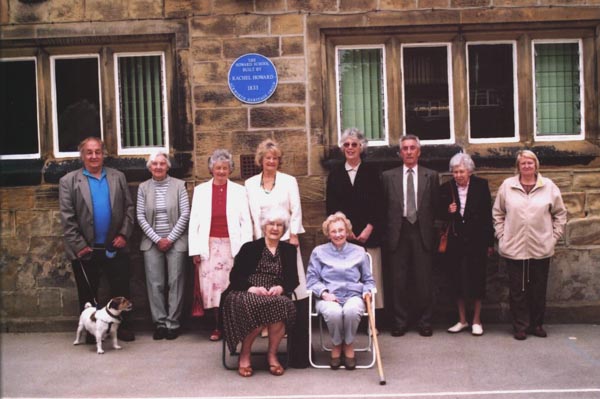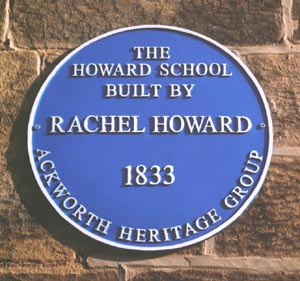The Howard Family - Background Papers |
|||||||||||||
Amongst the surviving family papers and photographs there are some that will be of wider interest, both to members of the extended family, and also to those studying the life style of people such as these, industrious and pious together. Annotated transcripts have been made and these are available for downloading as PDF files.
The family background to these Howards has for long been a matter of uncertainty and controversy. To give a flavour of this, the following is taken from the introduction to a Family Tree of Luke Howard's descendants produced by Bernard Howard in 1949. It consists mainly of an extract from an 1865 Howard Pedigree. Luke's great-grandfather, Stanley Howard, is the most suitable starting point, since he was the first Howard of this line to join the Society of Friends, after having been adopted as an orphan by a Quaker family at Hitchin, and apprenticed to a wool-stapler in that town. Stanley's parentage has been the subject of prolonged controversy from which the incontrovertible truth has not so far emerged; the parents and grandparents attributed to him in the ‘Pedigree of Howard’ cannot be substantiated by definite proofs and, since they represent only one suggested solution out of several alternatives that have been put forward, all reference to them has been omitted. "Luke Howard was throughout life devotedly attached to scientific pursuits, especially to the study of meteorology, to which science he rendered very important service as to cause him not unfrequently to be styled the father of modern meteorology. His most enduring work is an essay on the modification of clouds, suggesting a nomenclature which has since been generally adopted by the scientific world. This book, having fallen under the observation of Goethe, so interested the great German poet as to induce him to seek through the medium of a friend some further particulars of the personal history of the author. Mr. Howard replied to this solicitation in a letter of considerable length, chiefly filled with remarks on the science of meteorology, but containing some particulars of his schoolboy days and settlement in life, and the following account of his ancestors:
Luke Howard was elected a Fellow of the Royal Society in 1821 – he was an active member of the British and Foreign Bible Society, and assisted in various religious and philanthropic efforts both by his writings and otherwise. Amongst his scientific works may be mentioned The Climate of London, being the result of eighteen years’ observation of meteorological phenomena; Barometrographia, seven lectures on meteorology, etc., and many, if not all, the articles on meteorology in Rees's Cyclopaedia. The tradition mentioned by Mr. Howard, in his letter to Goethe, is in a great degree confirmed by the fact that Charles the eleventh Duke of Norfolk called once and again on Mr. Thomas Howard of Stockwell to offer him his assistance in establishing his pedigree, which offer was only at length declined in compliance with the scruples of his wife, and in conformity with the principles adopted by the Society of Quakers. See also a remark (referring to this period) in Burke's Peerage edition 1839, article ‘Norfolk’, p. 770. The Christian name of Gravely is no doubt a mistake, caused perhaps by Mr. Howard's writing at the time from memory. In other accounts of the family the same person is called Stanley (see ante, p. 498), and this latter authority we have followed in the pedigree. Graveley is the name of a village and manor in Hertfordshire, whence in all probability the prenomen adopted by the Whittingstall family. In the last century their chief residence appears to have been at Hitchin. We find them also mentioned in the description of Hoddesdon and Broxbourne. - Vide, Clutterbuck's Hertfordshire. The only connection of the families of Howard and Stanley that has come under my notice is the marriage of Dorothy, daughter of Thomas second Duke of Norfolk, with Edward third Earl of Derby, whose second son Sir Thomas was grandfather of `the celebrated Venetia Stanley', the wife of Sir Kenelm Digby, knight. Kingsdon, com. Somerset. In the 6th Edw. VI the manor of Kingsdon (anciently Kingesdown) with its appurtenances and the advowson of the church, and the lands, tenements, and hereditaments in Kingsdon, were held by Sir Edward Fiennes, knt., Lord Clinton and Say, of the king, by the twentieth part of a knight's fee. In the succeeding reign the same manor belonged to Nathaniel Arundel, Esq., and subsequently was the property of the Earl of Arundel.-History of Somerset, by the Rev. John Collinson, F.A.S., 1791. Philip Howard, fifth Duke of Norfolk, succeeded to the Earldom of Arundel on 1579 in right of his mother."
Some further Notes on Luke Howard's life Luke Howard was the eldest son of the second family of Robert Howard (of Old Street) who, being a widower with three children, had married Elizabeth Leatham of Pontefract as his second wife in February 1772. Luke was
born at Red Cross Street, London, on 28 November 1772, and, when eight
years old, was sent to school at Burford in Oxfordshire, where he remained
till 1787. He was then apprenticed to a pharmaceutical chemist, Ollive
Sims at Stockport and, in 1795, set up business in Fleet Street. He
married Mariabella Eliot in 1796 and shortly afterwards went into
partnership with William Allen, a forerunner of the firm of Allen &
Hanburys, moving from Fleet Street to Plaistow in order to supervise their
manufacturing branch already established there. The partnership was
dissolved in 1807 and, soon afterwards, Luke moved his family to
Tottenham, and his factory to Stratford. A century later his descendants
moved the Works to the present site of Howards & Sons Ltd., Ilford. He
was elected a Fellow of the Royal Society (mainly for his work on
meteorology) in 1821 and, giving up his active business life, bought an
estate at Ackworth,
near Pontefract.
Luke was an active member of the British & Foreign Bible Society, and assisted in various religious, educational and philanthropic efforts both by his writings and otherwise. He died in March 1864 in his ninety second year. |
|||||||||||||

